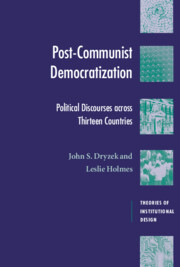Book contents
5 - Belarus
Published online by Cambridge University Press: 22 September 2009
Summary
Of all the countries analyzed in this book, Belarus is arguably the one with the least developed identity; only Moldova might compete. The territory of what is now Belarus (formerly known as Belorussia, and sometimes in English as White Russia) was a part of Kievan Rus' from the tenth century, and later experienced Russian, Polish, and Lithuanian rule. By the late eighteenth century, it was part of the Russian Empire. This relationship has persisted, apart from a few brief periods during or shortly after wars. Even now, its relationship with Russia is the closest of all the Commonwealth of Independent States members.
Belarus's nationalist phases have been short-lived, and support for them limited. There was a half-hearted attempt to become independent of Russia in 1917, even a formal declaration of independence in 1918 (associated with the poet Yanka Kupala; see Holtbrügge, 1996, p. 49), after Belarus had temporarily come under German rule. Following brief Polish control, Belarus returned to Moscow's tutelage by the 1920s, expanded by the transfer of some Russian territory. The Germans occupied the country during the Second World War. Thereafter Belarus remained part of the Soviet Union until the latter's collapse in 1991. Nationalism at that point was strong enough for Belarus to declare independence, but again such sentiment was weak and short-lived.
Belarus was in many ways an economic success story in the Soviet era, in comparison both with other parts of the Soviet Union and with its own past.
- Type
- Chapter
- Information
- Post-Communist DemocratizationPolitical Discourses Across Thirteen Countries, pp. 79 - 91Publisher: Cambridge University PressPrint publication year: 2002



